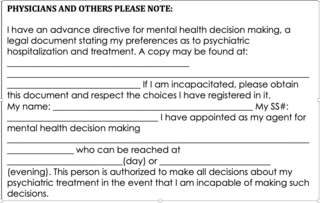Psychiatry
Do You Have A Psychiatric Advanced Directive?
We're able to plan for future medical care. What about our psychiatric care?
Posted November 21, 2019
In August, 2014, following the tragic suicide of comic genius Robin Williams, Kay Redfield Jamison published an article in the NY Times titled “To Know Suicide.” In this essay, Dr. Jamison mentions that she has a (psychiatric) advanced directive. A psychiatric advanced directive (PAD) is a document that may be used to detail a person’s specific instructions or preferences regarding future mental health treatment. A PAD form is typically completed over time and in conjunction with a person’s therapist and/or psychiatrist while they are physically and emotionally healthy and in a good frame of mind. The person may also want to include a family member. A PAD is completed in case the situation arises when the person becomes symptomatic with her psychiatric illness. In that case, she may lose the ability to give consent or may withhold informed consent to any kind of treatment during this acute episode.

In December, 2018, The NY Times published an article about psychiatric advanced directives, titled “Now Mental Health Patients Can Specify Their Care Before Hallucinations and Voices Overwhelm Them.” I think the title is somewhat misleading because it implies that PAD’s may apply only to people who experience psychotic disorders. I believe PAD’s can work for anyone who has been diagnosed with a mental illness.
What about a person with bipolar disorder who is in the throes of a manic episode? It would benefit him and his family to have completed a PAD. Same with a severe depressive episode. I have, at times, been so severely depressed that my depression manifested itself with psychotic features, which is different from the psychosis present in schizophrenia or schizoaffective disorder.
I mentioned PAD’s to my psychiatrist, Dr. L. and she didn’t know what they were.
“What rock have you been hiding under? I asked.
When I got home, I e-mailed her several links. I’ve been back in therapy with her for about a year-and-a-half following my stroke and the depression that ensued. Dr. L. and I are meeting once every other week. I’m planning to be back at work full-time this upcoming Christmas week (just in time to cover for everyone else who is taking time off!). Dr. L. and I planned to terminate therapy at the end of the year, but I expressed a desire for several more sessions to see me through the transition of being back at work full-time and she agreed.
Before the stroke, I was stable on one antidepressant. Now I’m taking three different psychotropic medications and I’d like to try to cut just one, but of course I’m anxious about it. Will I regress? Did the stroke change my brain chemistry so now I need these three medications to remain emotionally stable? Is that even a thing?
To my recollection, I’ve never fought against the treatment Dr. L. recommended. We’ve both agreed that ECT doesn’t work for me. Based on past experience, a course of ECT treatment works for about a month, than I crash back to where I was or worse. And I’ve lost huge chunks of my past from the treatments I’ve had. On a psychiatric unit, I can’t recall ever refusing meds.
Regardless, next week when I see Dr. L. again, I will speak to her about completing a PAD. I do have a legal will, a medical advanced directive and a do not resuscitate order. It will be interesting to see what her thinking is.
For those of you who are interested in taking the first step toward completing a psychiatric advance directive, I suggest you speak to your therapist or psychiatrist.
Here’s some information from the National Resource Center on Psychiatric Advanced Directives and here is some additional information and a sample form on how to prepare an advance directive for mental health decision making.
Good luck!


